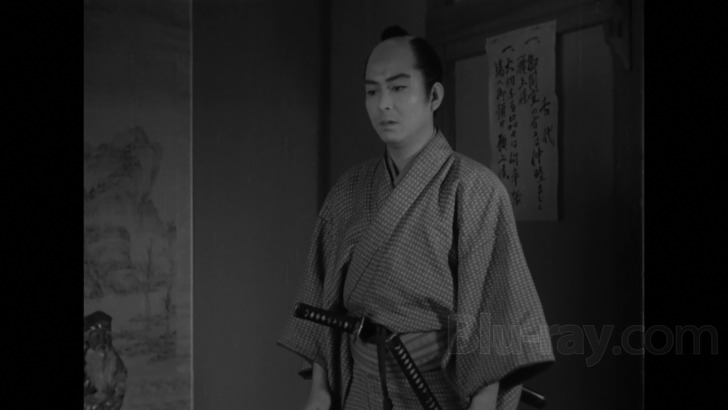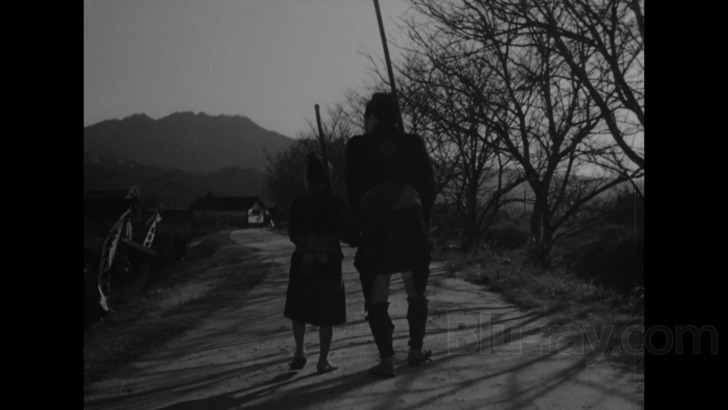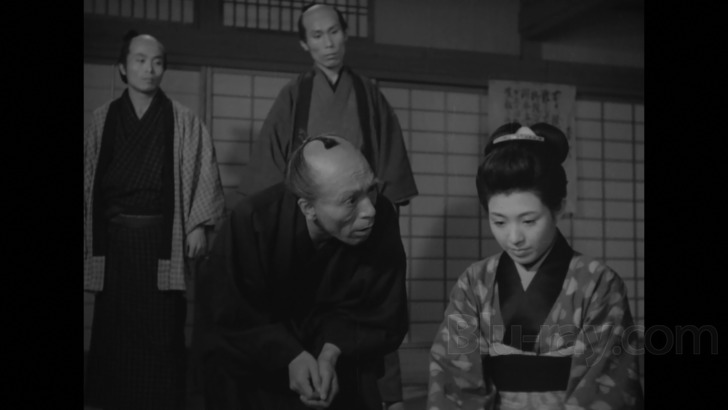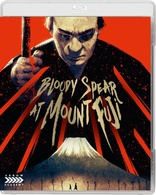Bloody Spear at Mount Fuji Blu-ray Movie
HomeBloody Spear at Mount Fuji Blu-ray Movie 
血槍富士 / Chiyari Fuji | Arrow AcademyArrow | 1955 | 94 min | Not rated | Sep 04, 2018
Movie rating
7.1 | / 10 |
Blu-ray rating
| Users | 0.0 | |
| Reviewer | 3.5 | |
| Overall | 3.5 |
Overview
Bloody Spear at Mount Fuji (1955)
A young samurai, Shojuro Sako, travels on the Tokaido to Edo with his two servants, Genta and Gonpachi. Gonpachi has been told by Shojuro's mother to prevent his Master from drinking... The road is not safe. On the way, they meet young orphan boy, Jiro, and many other travellers: A team of great directors, including Yasujrio Ozu, Hirochi Shimizu and Daisuko Ito, assisted Uchida with his remarkable post-war comeback film. It's an affable samurai road movie with a focus on unglamorus characters, as a dim-witted samurai and his servants traverse the Tokaido highway. Much of the film is played as comedy, making the brilliantly staged violent climax all the more shocking.
Starring: Ryunosuke Tsukigata, Daisuke Katô, Eitarô Shindô, Toranosuke Ogawa, Chiezo KataokaDirector: Tomu Uchida
| Foreign | 100% |
| Drama | 30% |
| Period | Insignificant |
| Action | Insignificant |
Specifications
Video
Video codec: MPEG-4 AVC
Video resolution: 1080p
Aspect ratio: 1.37:1
Original aspect ratio: 1.37:1
Audio
Japanese: LPCM 2.0 Mono
Subtitles
English
Discs
Blu-ray Disc
Single disc (1 BD)
Playback
Region A, B (locked)
Review
Rating summary
| Movie | 4.0 | |
| Video | 3.0 | |
| Audio | 3.0 | |
| Extras | 2.5 | |
| Overall | 3.5 |
Bloody Spear at Mount Fuji Blu-ray Movie Review
Reviewed by Jeffrey Kauffman September 6, 2018There might be a bit of a “glass half full, glass half empty” response on the part of some global film fans with regard to the release of the 1955 Japanese film Bloody Spear at Mount Fuji. As commentator Jasper Sharp mentions in his enjoyable tour through history (in more ways than one) included on this Blu-ray as a supplement, Bloody Spear at Mount Fuji is evidently and perhaps rather shockingly the first film by Tomu Uchida to be released for domestic consumption on Blu-ray, meaning the "glass half full" types may be shouting "hooray" that even one film has finally seen the high definition light of day, while the "glass half empty" crowd may be wondering why only one film has seen the high definition light of day. Sharp goes into some detail on Uchida’s long filmography, something that makes the director’s absence on home media all the more perplexing. As Sharp details, a lot of Uchida’s pre-World War II efforts, especially some of the early silent films (just one indication of how long Uchida worked in the film industry) are considered “lost forever” (though as any hopeful cineaste will know, sometimes miracles occur and supposedly lost films are in fact found). But even in the post-World War II era, Uchida continued to pump out a fairly consistent set of releases, which by my count topped twenty films between 1955 and 1970, when Uchida passed away. Some alert types may wonder why Bloody Spear at Mount Fuji was the first film Uchida shot after World War II, since it obviously came more or less a decade after hostilities had ceased, and for that biographical tidbit, I’ll refer you again to Sharp’s interesting commentary, with a simple aside that Uchida was taken prisoner in Manchuria toward the end of the War and wasn’t able to get back to Japan until circa 1954. Uchida’s name may not be that recognizable on this side of the pond, but (again as Sharp intimates) his work was deeply respected enough in his native land that one of his films, A Fugitive from the Past, which came out in 1965, placed Number Three in a Japanese poll of native film critics on an “All Time Best” list of Japanese films, beating out such legendary pieces as Akira Kurosawa’s Rashomon. Another film that Sharp talks about, at least briefly, Chikamatsu’s Love in Osaka from 1959, almost sounds like a precursor to Takashi Miike’s The Happiness of the Katakuris, at least in its appropriation of various non-cinematic arts to tell its story, if not in the actual story itself, something that may give credence to Sharp’s assertion that, despite a perceived lack of “auteur-ism”, Uchida’s efforts were often stylistically quite impressive.

Perhaps unexpectedly, I found myself thinking of The Canterbury Tales (at least the Geoffrey Chaucer original, if not this particular film adaptation) when watching Bloody Spear at Mount Fuji, perhaps because it follows some travelers while exploring some of the sociopolitical and/or socioeconomic differences between them. Sharp goes into some detail about how “egalitarian” the class structure seems to be in Bloody Spear at Mount Fuji, but even despite that perceived equality, there are certainly demarcations that are quite evident between “master” and “servant”, some of which are addressed overtly in the film.
There’s also a kind of almost Ingmar Bergman-esque quality to some of the opening shots following a bunch of “pilgrims” (for want of a better term), with Uchida framing things looking up with an artificial horizon line (courtesy of the point where land meets sky) diagonally bisecting the frame in a brief moment that some may feel presages some similar framings in The Seventh Seal (see screenshots 6 and 7). These pilgrims include hard drinking samurai Kojūrō (Eijirō Kataoka) and his servants Genta (Daisuke Katō) and Genpachi (Chiezō Kataoka), the latter of whom is the evidently honored spear carrier for Kojūrō. Already there are strata of relationships on display, something that’s only reinforced when a sweet little boy named Jirō (Motoharu Ueki) takes a shine to Genpachi and especially to the spear, asking if he can be a “spear carrier in training”, so to speak, which the lad in turn hopes will put him on a “career path” toward becoming an actual samurai.
Much as with Canterbury Tales, Bloody Spear at Mount Fuji is kind of a vignette driven enterprise, with the travelers encountering a number of other characters. There is definitely a through line, though, with subplots involving a mysterious thief and a kind of shocking aspect of a young girl being sold into prostitution, with virtually every element woven into an overarching depiction of class differences and perhaps inescapable strictures foisted off on various characters due to their economic realities. The various strands of characters’ stories are integrated surprisingly well as the film moves toward a rather raucous climax, which in turn gives way to a kind of sweet if slightly melancholic ending. There’s a really interesting mood generated by Bloody Spear at Mount Fuji this is both similar to and distinctively different from some of the historical films of Kurosawa that involve samurai, and my hunch is any lover of the Kurosawa samurai films will find a lot to like in Bloody Spear at Mount Fuji, a release which will hopefully be just the beginning of an Uchida renaissance for home theater aficionados.
Bloody Spear at Mount Fuji Blu-ray Movie, Video Quality 

Bloody Spear at Mount Fuji is presented on Blu-ray courtesy of Arrow Academy with an AVC encoded 1080p transfer in 1.37:1. Arrow's insert booklet contains the following verbiage on the transfer:
Bloody Spear at Mount Fuji is presented in its original Academy ratio (1.37:1) with mono sound.The fact that there's a certain lack of specificity as to what "original film and audio elements" were utilized, along with the somewhat unusual disclaimer (for Arrow, anyway) that picture and audio damage remain may indicate that, while generally perfectly acceptable, this transfer does have some issues. This is the rare Arrow release that looks like it has had some filtering applied, for while there is a grain field apparent, things do tend to have a somewhat smooth and textureless appearance at times, and even moments that involve things like optical dissolves don't show a real spike in grain that I personally would have expected. That said, fine detail can still be quite convincing (look at the ribbed pattern on the samurai's outfit in screenshot 8 for one example). There's pretty recurrent damage on display throughout this presentation, with quite a few scratches, nicks, flecks and dirt dotting the premises. In some cases, the scratches, while very apparent, can be very short lived (compare screenshots 5 and 14, which are separated by just a few frames, to see how quickly one scratch can appear and then disappear again). Some damage is longer lived and more noticeable (see the pretty ragged looking left side of the frame in screenshot 19 for one example). Midrange shots can often look fairly soft, which, along with what I'm assuming was some denoising, can give some parts of the film a somewhat waxy appearance. There's a kind of grayish undertone to much of the presentation which may indicate a duplicate element. All of this said, the presentation looks better in motion than some of the screenshots might suggest, and the historical importance of finally having a Uchida film on Blu- ray may outweigh or at least counterbalance some issues some videophiles may have with this presentation.
The film was scanned and restored from the original film and audio elements by Toei Company LTD, Japan. 2K scanning was done on a Golden Eye scanner and colour grading was completed on a DaVinci Resolve. Picture restoration was performed using MTI Correct and PF Clean. Some instances of picture and audio damage remain in this presentation, in keeping with the condition of these materials.
Bloody Spear at Mount Fuji Blu-ray Movie, Audio Quality 

Bloody Spear at Mount Fuji features a decent sounding LPCM 2.0 mono track. This doesn't have the same amount of damage that the video presentation does, but there is still recurrent boxiness and hiss, along with occasional pops and crackling that haven't been totally eliminated. Dialogue is generally presented cleanly, though, and the Blu-ray does come with optional English subtitles.
Bloody Spear at Mount Fuji Blu-ray Movie, Special Features and Extras 

- Commentary by Jasper Sharp
- Interview with Yasuka Uchida (1080i; 52:40) is an archival interview with the director's son. This suffers from some presentational weirdnesses - it appears that this was probably a French television piece and must have had French subtitles burnt into the original video, which have been blurred here. Things are now windowboxed with English subtitles presented underneath the actual image frame.
- Interview with Kazunori Kishida (1080i; 13:57) features Toie's publicist in another archival interview, and again seems to be sourced from a French television offering. In this case, however, things are not windowboxed, which means the blurred French subtitles often underlay the superimposed English ones.
- The Vagrant Filmmaker (1080i; 26:52) is an archival interview with French critic Fabrice Arduini produced by the same company which did the above two supplements, though in this case since Arduini is already speaking French, there are only English subtitles to contend with. This has a few snippets from other films which may pique some curiosity.
Bloody Spear at Mount Fuji Blu-ray Movie, Overall Score and Recommendation 

While the technical aspects of this release may not be completely optimal, I was still really excited to be able to see this film and it's one I plan on revisiting soon. The story is often quite captivating, and Uchida paces things briskly and gets fine performances out of a large and varied cast. I do recommend interested fans parse the screenshots included with this review to get some idea of the look of this Blu-ray, but with caveats duly noted, Bloody Spear at Mount Fuji comes Recommended.
Similar titles
Similar titles you might also like

The Sword of Doom
大菩薩峠 / Dai-bosatsu tôge
1966

Three Outlaw Samurai
三匹の侍 / Sanbiki no samurai
1964

Goemon
ゴエモン
2009

Killing
2018

Hara-Kiri: Death of a Samurai
一命 / Ichimei
2011

Sansho the Bailiff
山椒大夫 / Sanshô dayû
1954

Harakiri
切腹 / Seppuku
1962

Red Beard
赤ひげ / Akahige
1965

Les Miserables
I miserabili
1934

Rurouni Kenshin Part 2: Kyoto Inferno
るろうに剣心 京都大火編 / Rurôni Kenshin: Kyôto Taika-hen
2014

Lady Snowblood
修羅雪姫 / Shurayukihime
1973

An Actor's Revenge
雪之丞変化 / Yukinojô henge
1963

Dodes'ka-den
どですかでん / Dodesukaden
1970

Les Enfants Terribles
1950

Timbuktu
2014

The Rocket
2013

Ran
StudioCanal Collection
1985

Cría Cuervos
1976

Broker
브로커 / Beulokeo
2022

Shogun's Samurai: The Yagyu Clan Conspiracy
1978
